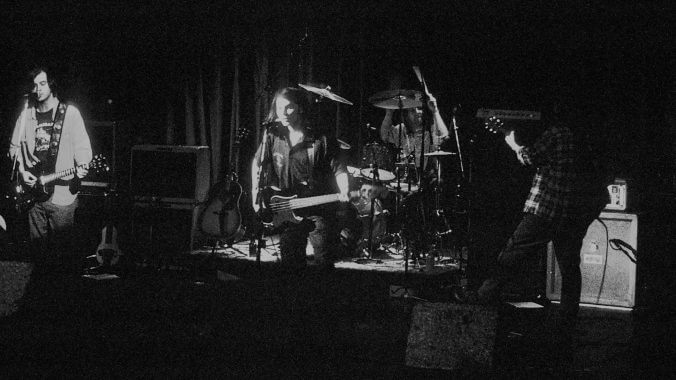Anodyne at 30: Uncle Tupelo’s Long Cut to the Heart of Alt-Country
Though Jeff Tweedy and Jay Farrar have found great acclaim with their bands Wilco and Son Volt, the roots of their brilliance can be traced back to Uncle Tupelo's fourth and final album.
Photo by Jim Steinfeldt/Michael Ochs Archives/Getty Images
In the summer of 1992, Belleville, Illinois alt-country trio Uncle Tupelo—headed by songwriting maestros Jay Farrar and Jeff Tweedy—released their third studio album, the anonymously titled March 16–20, 1992. Like so many albums of the time, this was a direct response to the overwhelming explosion of Nirvana’s Nevermind, which was released a year prior. With all manner of stuffed-shirts, trend-chasers and money-grubbers begging and pleading them to cash in on the alt-rock wave—to turn up the feedback, growl and perform as disaffected as possible—Uncle Tupelo had one clear and response: “Fuck you.” This “fuck you” took the form of a jangly, acoustic, bluegrass-inspired collection of original and traditional folk songs with an impenetrable title that spit in the face of conventional alt-rock wisdom. Uncle Tupelo was carving their own path in the most traditional sense, singing about the evils of capitalist coal companies while sticking their middle fingers up at the corruption of record companies. A little over a year later, Uncle Tupelo crystallized their rebellious spirit with Anodyne, an inspired, influential and, at times, acrimonious marriage of country, punk and alt-rock.
For reasons we’ll get into later, Anodyne is very much the beginning of the end for Uncle Tupelo—but, at the time, it seemed more like the beginning of a new beginning. After a fallout with Rockville Records over royalty payments—or lack thereof—the band moved to Sire records, who had recently released albums from Dinosaur Jr and The Replacements, in a deal that promised at least two Uncle Tupelo records. When it came to record, the band headed down to Austin, Texas’s Cedar Creek Studio to work with Brian Paulson—the engineer and producer whose recent success on Slint’s Spiderland and homey, ramshackle studio impressed Farrar, Tweedy and company. The two-week session centered on one-take recordings and resulted in the ideal middle ground between their early records.
1990’s No Depression, an album that would go on to define an entire genre and publication, is very much the work of angry young men with a bone to pick—equal parts breakneck punk and outlaw country, the earliest signs of what some have recently termed “bootgaze.” March 16-20, 1992, on the other hand, is steeped in tradition, almost exclusively acoustic and features a healthy dose of fiddles, lap steels and banjo. From the first moments of Anodyne, it’s obvious Uncle Tupelo are not reinventing themselves so much as they were polishing the foundations already in place. The fiddle is an inherently cinematic instrument and “Slate” implements this to near perfection, sweeping up the pathos of dusty barroom floors and dilapidated factory towns and serving as the ideal prelude to Farrar’s bourbon-soaked poetry. “Loneliness drinks the bitters til the cold winds warm again”; Farrar alway sounded like a middle-aged drifter at the far-end of his rope, but it’s here where Uncle Tupelo found the perfect canvas for that smokey palette. And yet, it’s only a few songs later, on the Tweedy-penned “The Long Cut,” that they abandon all remnants of old-timey traditionalism in favor of high-voltage feedback—blowing the roof off the old farmhouse, so to speak.
-

-

-

-

-

-

-

-

-

-

-

-

-

-

-

-

-

-

-

-

-

-

-

-

-

-

-

-

-

-

-

-

-

-

-

-

-

-

-

-








































